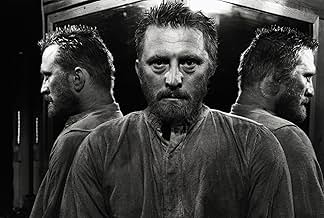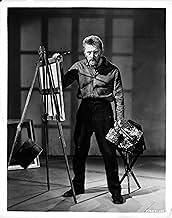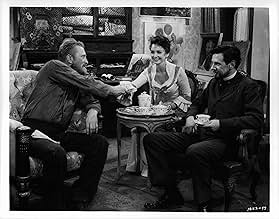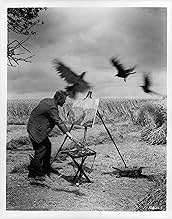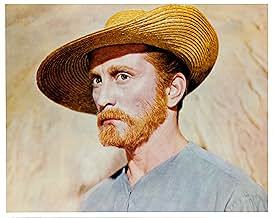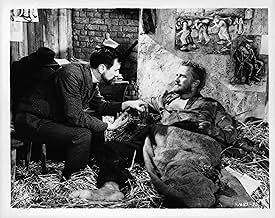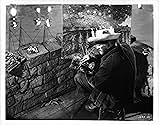CALIFICACIÓN DE IMDb
7.3/10
13 k
TU CALIFICACIÓN
La vida del brillante pero torturado artista Vincent van Gogh.La vida del brillante pero torturado artista Vincent van Gogh.La vida del brillante pero torturado artista Vincent van Gogh.
- Dirección
- Guionistas
- Elenco
- Ganó 1 premio Óscar
- 4 premios ganados y 6 nominaciones en total
- Dirección
- Guionistas
- Todo el elenco y el equipo
- Producción, taquilla y más en IMDbPro
Opiniones destacadas
I've seen this movie several times now, and every time with enjoyment and great appreciation.
The acting by Douglas and Quinn is truly first rate. It's a shame Douglas didn't get the best actor Oscar for which he was so deservedly nominated, but competition that year in that category was fierce. He truly makes you feel van Gogh's frightened agony, both at not being able to achieve what he wanted in his art and his fear of approaching insanity. (It ran in van Gogh's family; he knew what was coming.)
But I also enjoy the great efforts made to reproduce the scenes van Gogh painted, whether in Holland, Arles, or outside Paris. That couldn't have been easy, but if you know van Gogh's work, it really adds to the effect the movie makes.
There are times when the characters speak like an art history textbook - though those painters did love to discuss their theories on art, as you see in their letters.
Still, I consider this to be one fine movie. Whether it gives an accurate depiction of van Gogh or Gauguin is beside the point. It's based on a novel by Irving Stone, who didn't hesitate to change facts to make for a book that would sell; it's not a BBC documentary, and shouldn't be judged as such. It does a great job of showing us the torments of a great painter, and gives us some idea of what van Gogh was up to. That's more than enough for me.
The acting by Douglas and Quinn is truly first rate. It's a shame Douglas didn't get the best actor Oscar for which he was so deservedly nominated, but competition that year in that category was fierce. He truly makes you feel van Gogh's frightened agony, both at not being able to achieve what he wanted in his art and his fear of approaching insanity. (It ran in van Gogh's family; he knew what was coming.)
But I also enjoy the great efforts made to reproduce the scenes van Gogh painted, whether in Holland, Arles, or outside Paris. That couldn't have been easy, but if you know van Gogh's work, it really adds to the effect the movie makes.
There are times when the characters speak like an art history textbook - though those painters did love to discuss their theories on art, as you see in their letters.
Still, I consider this to be one fine movie. Whether it gives an accurate depiction of van Gogh or Gauguin is beside the point. It's based on a novel by Irving Stone, who didn't hesitate to change facts to make for a book that would sell; it's not a BBC documentary, and shouldn't be judged as such. It does a great job of showing us the torments of a great painter, and gives us some idea of what van Gogh was up to. That's more than enough for me.
Although I started my academic career as an art major, my interest was always in making art of my own rather than studying the works of the past masters. As a result, I wouldn't know a Manet from a Monet, but one painter whose work I can always identify is Vincent Van Gogh, perhaps the most famous example of the "tortured artist" who sought solace from the pain of life through his work. Like so many artists from different mediums, Van Gogh's life, especially the dramatic episode in which he sliced off his ear in an epileptic fit, is more famous than his work, a situation heightened, no doubt, by Don Mclean's melancholy ballad "Vincent," an improbable chart topper in 1972. Prior to being honored by the composer of "American Pie," Van Gogh's biggest brush with popular success came with Vincent Minnelli's film of Irving Stone's best-seller, an often melodramatic but still effective dramatization of the artist's troubled life. Kirk Douglas' intense portrayal of the impoverished and often fanatical Dutchman is helped immeasurably by his physical resemblance to his subject. Bearded, and with his blonde hair dyed red, Douglas could easily be mistaken for the man whose self-portraits hang on the wall of the modest bedroom where much of the film takes place. Occasionally, Douglas' clenched teeth and fist approach to drama comes through to reveal the actor behind the makeup, but his Oscar nominated performance seldom falls victim to the actor's "star" persona. Even Anthony Quinn, an actor who has given the same performance in dozens of movies, is good, but his brief turn as Paul Gaughan is hardly distinguished enough to merit the Oscar for best supporting actor. The rest of the cast is beautifully assembled with James Donald properly sympathetic as Vincent's patient, supportive brother, Theo, and no way can I complain about any film that finds room for the splendid presence of Henry Daniell, seen here as the patriarch of the Van Gogh family. The paintings, a wild riot of colorful intensity, are seen throughout (courtesy of numerous private collectors and public museums, including my hometown's Cleveland Museum of Art), and without them, "Lust for Life" would have a lot less luster.
This film is a rarity, a biopic which is more accurate than the book it's based on. Irving Stone's book was a major best-seller which did much to make Vincent Van Gogh one of the ten most famous artists in history but it did have its inaccuracies, particularly when it depicted its protagonist in Paris with other great painters of the time. In the book, Gauguin, Lautrec, Cezanne and Rousseau come off as typical bohemians while Vincent was made much more of a leader than he was. Minelli doesn't give us a detailed look at any of the artists except Gauguin but he is more accurate about who influenced Van Gogh and he does include his best friend, the now-forgotten Emile Bernard, if only as an extra in Tanguy's shop.
When Lust for Life came out, several critics dismissed it as too lurid and melodramatic, but those adjectives are accurate in describing Van Gogh's life. Note that Kirk Douglas does not play his usual cool, fun-loving tough guy and actually uses his whole body in his acting. For once Hollywood outdid itself.
When Lust for Life came out, several critics dismissed it as too lurid and melodramatic, but those adjectives are accurate in describing Van Gogh's life. Note that Kirk Douglas does not play his usual cool, fun-loving tough guy and actually uses his whole body in his acting. For once Hollywood outdid itself.
Lust For Life may look, at first glance, to be a typical Hollywood biopic, which is usually not much more than a star vehicle about a famous, real-life but vacuously recreated character, denuded of any real personality. Minelli certainly makes his biopic of Vincent Van Gogh with his trademark lavishness. But, importantly, he does not glamorise his subject. Instead, he makes a visually rich but earthy film, which exalts Van Gogh's achievement and seeks to portray the realities of his creative life and the dark side of his personality.
Lust For Life focuses on the extremely troubled man Van Gogh was, at turns listless, priggish, childish, needy, manic and quick-tempered; but also sensitive, caring, thoughtful, romantic and altruistic. Kirk Douglas is superb as Van Gogh, holistically exhibiting his various and contradictory aspects: obsessive though circumspect artist, diffident but passionate friend, forlorn romantic and dangerous maniac. It is all the more of an accomplishment as he is such a muscular, good-looking leading actor (nor should Anthony Quinn's key supporting performance as Gauguin, a macho with hidden sensibilities, be neglected).
However, at the same time, what the film never forgets is Van Gogh's considerable achievement. Minelli's iridescence complements Van Gogh's colourful, vivacious visual style, and many of his paintings are shown throughout the film.
Critics have pointed to the over-use of melodrama in the film. Yet Lust For Life is rare in that the film is consummated by its melodrama, along with Miklós Rózsa's grand, sweeping music. In other words, its melodrama succeeds, making the viewer identify more with Douglas' Van Gogh, giving him a greater, but also justified, pathos and sense of tragedy.
Lust For Life is the best Hollywood Biopic
Lust For Life focuses on the extremely troubled man Van Gogh was, at turns listless, priggish, childish, needy, manic and quick-tempered; but also sensitive, caring, thoughtful, romantic and altruistic. Kirk Douglas is superb as Van Gogh, holistically exhibiting his various and contradictory aspects: obsessive though circumspect artist, diffident but passionate friend, forlorn romantic and dangerous maniac. It is all the more of an accomplishment as he is such a muscular, good-looking leading actor (nor should Anthony Quinn's key supporting performance as Gauguin, a macho with hidden sensibilities, be neglected).
However, at the same time, what the film never forgets is Van Gogh's considerable achievement. Minelli's iridescence complements Van Gogh's colourful, vivacious visual style, and many of his paintings are shown throughout the film.
Critics have pointed to the over-use of melodrama in the film. Yet Lust For Life is rare in that the film is consummated by its melodrama, along with Miklós Rózsa's grand, sweeping music. In other words, its melodrama succeeds, making the viewer identify more with Douglas' Van Gogh, giving him a greater, but also justified, pathos and sense of tragedy.
Lust For Life is the best Hollywood Biopic
Irving Stone wrote his book 'Lust for Life' in 1934 and MGM obtained the film rights to it in 1946, long before there was any intention to create this film. Biographical films about the lives of artists were not regarded as likely to be financially viable, and at the time Van Gogh, who had only sold one painting in his lifetime, was not really well known to the public or regarded as the most promising subject for such a film. This changed following a very successful exhibition of his works in 1955 and MGM decided to commission Minnelli to direct the film for them, but they had little time left to create it as their film rights to the book expired at the end of 1955. This greatly complicated the production. For example, rights to create still reproductions of almost 200 of Van Gogh's works for this film had to be negotiated with all the museums, galleries and private collectors world-wide who owned them, the pictures then had to be copied by special still cameras requiring only low illumination levels, and printed as large transparencies that could be back-lit for filming in any scenes where they were visible. Minnelli was a good choice as Director - previously a stage designer he was known for artistic sensibilities and an eye for colour. In his memoirs Minnelli reports two major battles with the studio moguls, one he won - the other he lost. Minnelli knew the Metrocolor process used at MGM generated saturated colours which would be too garish for this film. He had recently finished filming Brigadoon using Anscocolor stock and insisted this was what was needed, but Anscocolor cine stock had just been discontinued. MGM eventually agreed to buy up the last 300,000 feet of unused Anscocolor stock available, and to set up a laboratory in which it could be processed. Minnelli also bitterly opposed working in CinemaScope format, claiming the large aspect ratio was incompatible with most paintings, and would also spoil the intimacy of many of the scenes to be filmed; but he was over-ruled on this.
Half a century later we are in a position to appreciate how right he was over both these issues. Like most viewers my first reactions to a film I am watching usually relate to the quality of the film-script, the direction and the acting. If these are acceptable I know I am likely to feel that I have seen a very good film. But film stock remains very important - as a still photographer myself I am well aware of the need to evaluate whether a particular shot should be made on, for example, Fuji's Sensia, Astia or Velvia emulsions - the wrong choice usually destroys the effect the photographer is striving for. It is the same with movies - I can recall just four films ('The Riddle of the Sands',' Laura, les Ombres de l'Ete', 'Black Narcissus' and 'Lust for Life') where one of my first reactions has been admiration for the atmospheric qualities and colour rendering of the photography. There may have been others but such films are certainly not very numerous. Although the opening credits of L4L still attribute the colour to Metrocolor, this film could not have succeeded as it did if MGM had been unable to obtain the Ansco stock that was actually used. As for aspect ratio, we have only to compare the VHS version with the new widescreen DVD to confirm that Minnelli's vision was correct (and this is of course after he did everything possible to utilise sequences which take maximum advantage of the widescreen presentation that he was forced to adopt.)
The film-script has been criticised for inaccuracies in Van Gogh's life as shown (unfairly as it is based on Irving Stone's book, which is normally classed as a novel rather than a biography. MGM might have done better to write an independent film-script and present their film as a biography- not as a film of a novel. What probably prevented this was recognition that they would then be responsible for any errors.) As written it is a very powerful depiction of the gradually increasing intensity of Van Gogh's commitment to his art, which increasingly became the only significant driving force in everything he did. The two hour overall running time is just about right - the emotional impact of watching the gradual disintegration of Van Gogh's personality might have become quite distressing for some viewers if the film has been a great deal longer.
The acting is exceptional. Kirk Douglas, a remarkable look-alike to extant pictures of Van Gogh, put everything into his effort to create a believable picture of a man with an increasingly fanatical drive which eventually overwhelmed him. It earned him an Oscar nomination, but not an award. This, I feel, was not his fault - Van Gogh was too insecure to interact normally with others and this would have showed in his whole bearing, something an individual as secure and stable as Kirk could not easily emulate. An actor is by nature an extreme extrovert and trying to take the part of an introvert is very difficult - when the introvert is both fanatical and unbalanced it probably becomes impossible. This makes it hard to become involved with Kirk's portrayal of the role in the same way that one would have done with Van Gogh himself. Anthony Quinn's Best Supporting Actor Oscar award for his role as Paul Gauguin was well deserved. There were also memorable performances by James Donald as Theo and Pamela Brown as Christine. Theo's anguish in the deathbed sequence came over very effectively. The direction and camera work, although not faultless, were both of an extremely high standard. All in all, anyone interested either in modern painting or in the lives of modern painters will find this a most rewarding film to watch.
Half a century later we are in a position to appreciate how right he was over both these issues. Like most viewers my first reactions to a film I am watching usually relate to the quality of the film-script, the direction and the acting. If these are acceptable I know I am likely to feel that I have seen a very good film. But film stock remains very important - as a still photographer myself I am well aware of the need to evaluate whether a particular shot should be made on, for example, Fuji's Sensia, Astia or Velvia emulsions - the wrong choice usually destroys the effect the photographer is striving for. It is the same with movies - I can recall just four films ('The Riddle of the Sands',' Laura, les Ombres de l'Ete', 'Black Narcissus' and 'Lust for Life') where one of my first reactions has been admiration for the atmospheric qualities and colour rendering of the photography. There may have been others but such films are certainly not very numerous. Although the opening credits of L4L still attribute the colour to Metrocolor, this film could not have succeeded as it did if MGM had been unable to obtain the Ansco stock that was actually used. As for aspect ratio, we have only to compare the VHS version with the new widescreen DVD to confirm that Minnelli's vision was correct (and this is of course after he did everything possible to utilise sequences which take maximum advantage of the widescreen presentation that he was forced to adopt.)
The film-script has been criticised for inaccuracies in Van Gogh's life as shown (unfairly as it is based on Irving Stone's book, which is normally classed as a novel rather than a biography. MGM might have done better to write an independent film-script and present their film as a biography- not as a film of a novel. What probably prevented this was recognition that they would then be responsible for any errors.) As written it is a very powerful depiction of the gradually increasing intensity of Van Gogh's commitment to his art, which increasingly became the only significant driving force in everything he did. The two hour overall running time is just about right - the emotional impact of watching the gradual disintegration of Van Gogh's personality might have become quite distressing for some viewers if the film has been a great deal longer.
The acting is exceptional. Kirk Douglas, a remarkable look-alike to extant pictures of Van Gogh, put everything into his effort to create a believable picture of a man with an increasingly fanatical drive which eventually overwhelmed him. It earned him an Oscar nomination, but not an award. This, I feel, was not his fault - Van Gogh was too insecure to interact normally with others and this would have showed in his whole bearing, something an individual as secure and stable as Kirk could not easily emulate. An actor is by nature an extreme extrovert and trying to take the part of an introvert is very difficult - when the introvert is both fanatical and unbalanced it probably becomes impossible. This makes it hard to become involved with Kirk's portrayal of the role in the same way that one would have done with Van Gogh himself. Anthony Quinn's Best Supporting Actor Oscar award for his role as Paul Gauguin was well deserved. There were also memorable performances by James Donald as Theo and Pamela Brown as Christine. Theo's anguish in the deathbed sequence came over very effectively. The direction and camera work, although not faultless, were both of an extremely high standard. All in all, anyone interested either in modern painting or in the lives of modern painters will find this a most rewarding film to watch.
¿Sabías que…?
- TriviaIn his memoir "The Ragman's Son" Kirk Douglas recounted that John Wayne attended a screening of the film, and was horrified. "Christ, Kirk! How can you play a part like that? There's so few of us left. We got to play strong, tough characters. Not those weak queers," Wayne said. Douglas tried to explain, "It's all make-believe, John. It isn't real. You're not really John Wayne, you know." Wayne (born Marion Morrison) looked at him oddly, as if Douglas had betrayed him.
- ErroresAt Arles, when Paul Gauguin is explaining his philosophy, Vincent mistakes him for Theo saying "but Theo, err Paul..." However, this is in the script. The whole point of the line is that Van Gogh views his conversation with Gauguin as nothing more than an extension of talks he's had with Theo since childhood.
- Citas
Paul Gauguin: I'm talking about women, man. Women. I like 'em fat and vicious and not too smart. Nothing spiritual either. To have to say 'I love you' would break my teeth. I don't want to be loved.
Vincent Van Gogh: You really mean that, Paul.
- ConexionesFeatured in Van Gogh: Darkness Into Light (1956)
- Bandas sonorasLa Marseillaise
(1792) (uncredited)
Written by Claude Joseph Rouget de Lisle
Played by a band in France, near the end
Selecciones populares
Inicia sesión para calificar y agrega a la lista de videos para obtener recomendaciones personalizadas
Detalles
Taquilla
- Presupuesto
- USD 3,227,000 (estimado)
- Tiempo de ejecución2 horas 2 minutos
- Relación de aspecto
- 2.55 : 1
Contribuir a esta página
Sugiere una edición o agrega el contenido que falta

![Ver Trailer [OV]](https://m.media-amazon.com/images/M/MV5BNjMwYjdhMDItMDA1NC00YjJlLWFhZjctYWY5YjBlNDdiODFiXkEyXkFqcGdeQXRyYW5zY29kZS13b3JrZmxvdw@@._V1_QL75_UX500_CR0)
